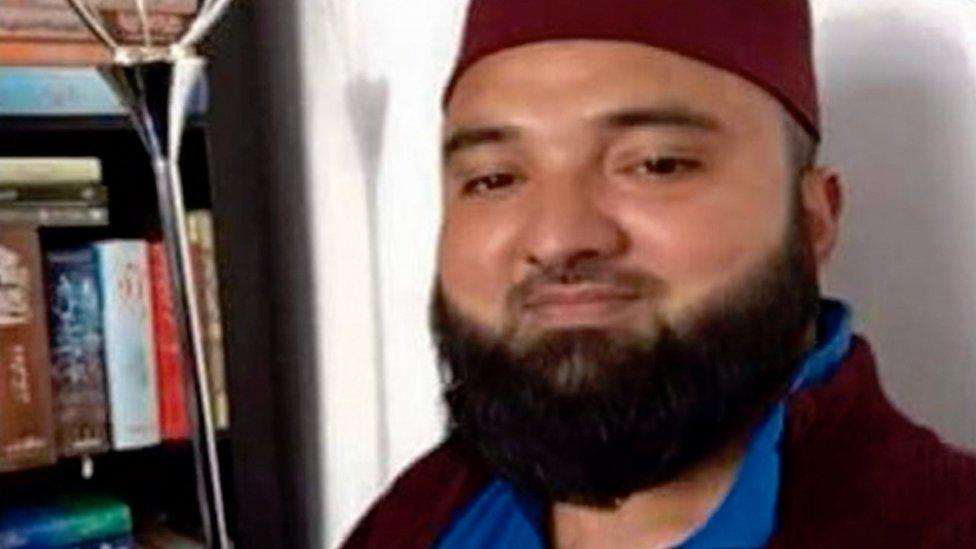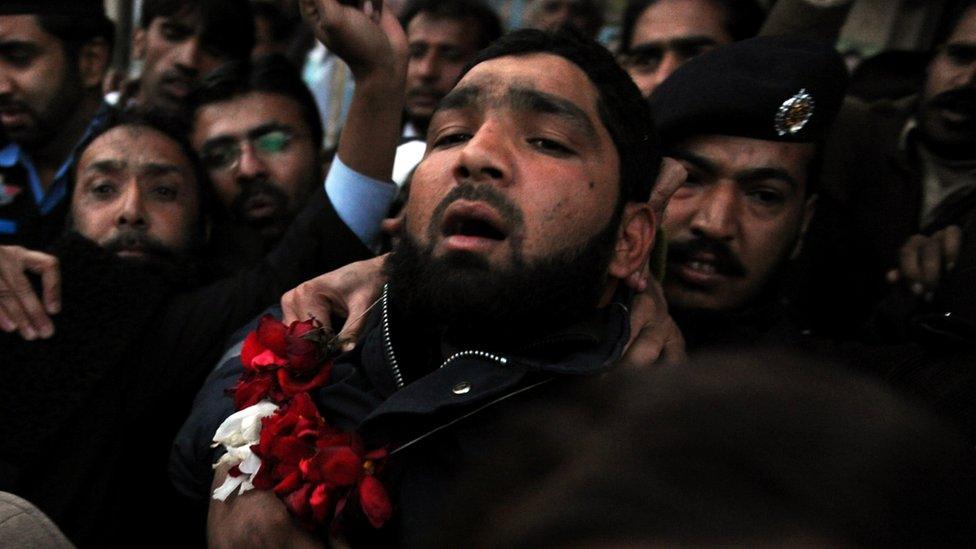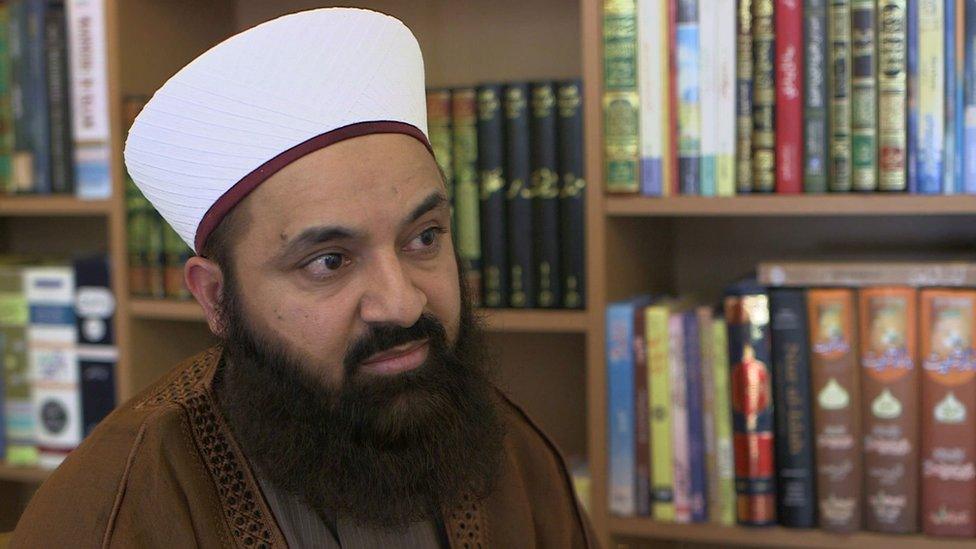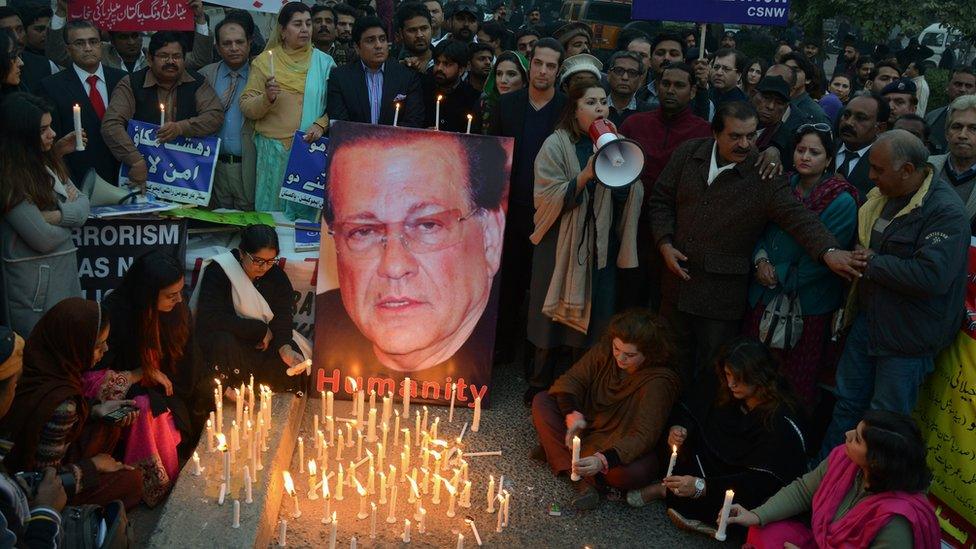How Pakistan inspired the Glasgow shopkeeper killer
- Published

Asad Shah's family moved to Scotland from Pakistan in the 1990s to escape persecution
To what extent was the murder of Glasgow shopkeeper Asad Shah inspired by the killing of a politician in Pakistan five years ago? And what does this mean for the UK?
CCTV images of the moments just before the murder of Glasgow shopkeeper Asad Shah show his killer, Tanveer Ahmed, angrily remonstrating with him.
Ahmed was incensed by YouTube videos Shah had made in which he claimed to be a prophet. Ahmed saw this as blasphemy that needed to be punished. He travelled to Scotland from his home in Bradford, then stabbed and beat his victim to death.
Ahmed was sentenced to a minimum of 27 years in jail - but appears completely unrepentant.
In statements released in court Ahmed makes it clear he sees himself as defending the "honour" of the prophet Muhammad. I met friends of his in Bradford who told me they sympathised with his motivation even if they didn't completely agree with his actions.

Tanveer Ahmed claimed that he murdered Mr Shah as he had "disrespected" Islam
In carrying out the killing Ahmed was emulating the actions of another murderer whom he idolised - Mumtaz Qadri.
Qadri killed a prominent Pakistani politician called Salman Taseer in January 2011 for trying to reform the country's controversial blasphemy laws.
Qadri was executed in February 2016, but was seen by many in Pakistan as a kind of hero for - in their view - defending Islam. Qadri also had numerous supporters in Britain - including Ahmed.
Qadri's brother in Pakistan told me that Ahmed used to write letters to Qadri whilst Qadri was awaiting execution. And Ahmed even called Qadri's brother after committing the murder in Glasgow to boast about it.
Ahmed's close links to Mumtaz Qadri have shone a light on support for the Pakistani killer in Britain. Few are willing to openly praise Ahmed and the killing in Glasgow - but after Mumtaz Qadri was executed in February a number of British mosques held ceremonies in honour of Qadri - and some imams praised him as a "martyr" and a "warrior".
For Shaan Taseer, the son of Mumtaz Qadri's victim, hearing not only that some in Britain were praising his father's killer, but that one of his admirers had murdered someone - emulating his example - is a bitter blow.

Mumtaz Qadri on the day of his arrest in 2011 - he was later executed
"When my father was murdered, to see his murderer garlanded with flowers was shocking," he told BBC Newsnight.
"But somehow it wasn't so surprising knowing that Pakistan has since the 1980s been undergoing a state-sponsored radicalisation. To see something similar in Britain which is the birthplace of the Magna Carta, the crucible of parliamentary politics, was a very depressing sight, a very unhappy sight and extremely sobering."
We're used to small minorities within the British Muslim community holding extreme views, but what's different this time is that many of the most vocal supporters of Mumtaz Qadri in the UK completely oppose groups like the Taliban and so-called Islamic State.
Shaan Taseer on the link between the murder of Asad Shah and Salman Taseer
That includes Pirzada Muhammad Masood Qadiri, an Islamic scholar from Bolton. When Mumtaz Qadri was executed in Pakistan, he flew out to attend the funeral and express his support for him.
"The views of ISIS - these views are completely against Islam. In fact, we are the victims of their attacks," he said.
"Our leaders and scholars have tolerated a lot and behaved peacefully throughout history - but when our prophet is insulted then we Muslims cannot tolerate that. We can tolerate everything but not an insult to his honour."

Bolton scholar Masood Qadiri flew to Pakistan for the funeral of Mumtaz Qadri
Masood Qadiri refers to Mumtaz Qadri as both a "martyr" and a "warrior" - but says that he doesn't condone the fact Mumtaz Qadri took the law into his own hands in committing murder.
He argues Mumtaz Qadri didn't have a fair trial - and effectively blames the victim for provoking the attack with his statements on the blasphemy law.
"If a very decent person has his wife or mother insulted then he cannot control his feelings and so he will put his decency and proper thinking to the side and get very angry and out of control.
"And that's what has happened. In this case he [Mumtaz Qadri] lost all control over his feelings and could not control his anger."
As a result he says Mumtaz Qadri should have been freed on grounds of diminished responsibility - something that seems incredible, but is a view articulated by other British Muslim clerics too.
Given his views on the killing in Pakistan, I ask Masood Qadiri about his views on the killing in Glasgow.
He claims that it would be wrong to draw an analogy between the two - and support for Mumtaz Qadri doesn't necessarily mean support for Tanveer Ahmed.
"You cannot compare this country with Pakistan. Pakistan was created in the name of Islam. [The UK] was not created as a Muslim country and the Quran and Sunnah are not the law here."
But, I press him, aren't those like himself - who are supportive of Mumtaz Qadri - actually also supportive of Tanveer Ahmed too, but just worried about getting in trouble with the authorities?
He says "no".

A commemoration for politician Salman Taseer - five years on from his murder
But for Shaan Taseer, son of Mumtaz Qadri's victim, there is a clear correlation between the two murders. He wants the British authorities to do more to take on those praising his father's killer.
"To glorify a murderer is not to glorify the individual but to glorify his actions and to call on someone to emulate them. It is essentially a call to action.
"So when a man like Mumtaz Qadri is glorified then sooner or later a man like Tanveer Ahmed will commit murder. This is therefore a very dangerous idea. It is an idea that will lead to murder in the society. It is therefore an idea that must be addressed."
Tanveer Ahmed and Mumtaz Qadri both come from the Barelwi sect of Islam - normally associated with peaceful and spiritual interpretations of Islam - although both claim to have acted as individuals rather than on behalf of any group.
Many of those supportive of Mumtaz Qadri are also Barelwi. Masood Qadiri says the particular emphasis this school of thought places on the Prophet means they react more strongly to any perceived insult.
"We preserve all the traditions of the Prophet - how he lived his life - and we try and present the perfect picture of him. Because of that when someone insults him anywhere in the world the emotional feeling it creates in us is more than in any other group."
Some of those speaking out most strongly against the support shown in Britain for Mumtaz Qadri are other Barelwi scholars. They worry that open support for his actions is entrenching regressive views on blasphemy.
But blasphemy remains a deeply emotive subject. A spokesman for the Council of Mosques in Bradford - where Tanveer Ahmed lived - told me that while he completely condemned all acts of violence, one solution would be to introduce a blasphemy law in Britain.
It shows how the execution of Mumtaz Qadri and murder of Asad Shah are breathing new life into debates that many hoped we had left behind.
Secunder Kermani was reporting for BBC Newsnight. You can watch his report here